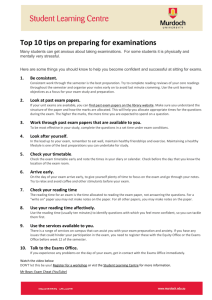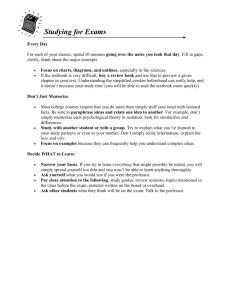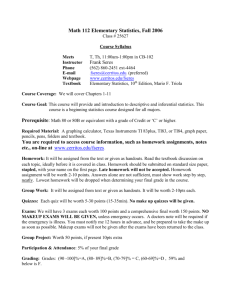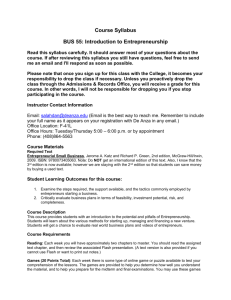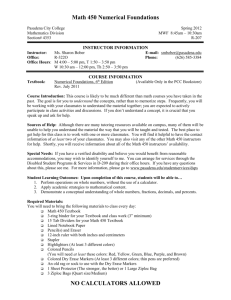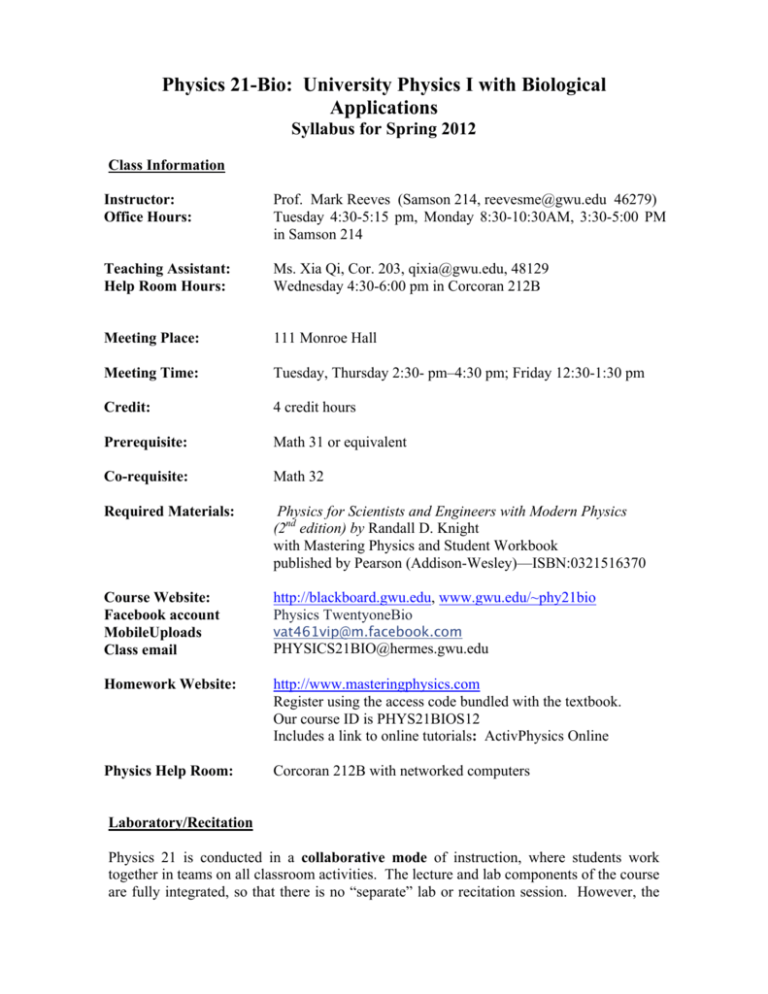
Physics 21-Bio: University Physics I with Biological
Applications
Syllabus for Spring 2012
Class Information
Instructor:
Office Hours:
Prof. Mark Reeves (Samson 214, reevesme@gwu.edu 46279)
Tuesday 4:30-5:15 pm, Monday 8:30-10:30AM, 3:30-5:00 PM
in Samson 214
Teaching Assistant:
Help Room Hours:
Ms. Xia Qi, Cor. 203, qixia@gwu.edu, 48129
Wednesday 4:30-6:00 pm in Corcoran 212B
Meeting Place:
111 Monroe Hall
Meeting Time:
Tuesday, Thursday 2:30- pm–4:30 pm; Friday 12:30-1:30 pm
Credit:
4 credit hours
Prerequisite:
Math 31 or equivalent
Co-requisite:
Math 32
Required Materials:
Physics for Scientists and Engineers with Modern Physics
(2nd edition) by Randall D. Knight
with Mastering Physics and Student Workbook
published by Pearson (Addison-Wesley)—ISBN:0321516370
Course Website:
Facebook account
MobileUploads
Class email
http://blackboard.gwu.edu, www.gwu.edu/~phy21bio
Physics TwentyoneBio
Homework Website:
http://www.masteringphysics.com
Register using the access code bundled with the textbook.
Our course ID is PHYS21BIOS12
Includes a link to online tutorials: ActivPhysics Online
Physics Help Room:
Corcoran 212B with networked computers
vat461vip@m.facebook.com
PHYSICS21BIO@hermes.gwu.edu
Laboratory/Recitation
Physics 21 is conducted in a collaborative mode of instruction, where students work
together in teams on all classroom activities. The lecture and lab components of the course
are fully integrated, so that there is no “separate” lab or recitation session. However, the
dates on which we anticipate that the main lab measurements will be done are shown on
the Schedule page.
Physics 21-Bio Course Description
Introduction
Physics 21 is the first of a three-part calculus-based University Physics sequence intended
for those who major in science and engineering. Physics 21 focuses on Classical
Newtonian Mechanics, Fluids, and Thermal Physics; Physics 22 covers Waves,
Electromagnetism, and Optics; Physics 23 deals with Modern Physics (Relativity and
Quantum Physics). What is special about our section is that we will focus on problems
that look at the physics of biological systems, in discussion, readings, classwork,
homework, and exams.
Course Objective
•
•
•
•
To help students develop analytical, graphical, and reasoning skills
To help students understand the fundamental concepts of physics
To enable students to apply these concepts qualitatively as well as to solve
problems in their fields of study quantitatively
To particularly highlight the linkages between quantitative modeling in physics and
understanding biological phenomena, particularly at the molecular level.
Textbook
The required textbook for the course is Physics for Scientists and Engineers with Modern
Physics (2nd edition) by Knight. We will cover chapters 1–13, 15-19 this semester in
Physics 21. Additional readings with content specific to biological problems will be
assigned and made available on-line. There is a Student Workbook that we will be using
extensively in this collaborative section of Physics 21. There is also an optional Student
Study Guide that is available from the same publisher.
Course Administration
We will use the Blackboard website http://blackboard.gwu.edu which you can access using
the userID and password of your GW email account. From the blackboard website, you
can access the course website http://www.gwu.edu/~phy21bio. The class website contains
news and announcements, the course syllabus, homework IDs, and other useful
information. Bookmark it and check it often.
Mathematics Background
A knowledge of simple differential and integral calculus, together with algebra, geometry,
and trigonometry, is needed for this course. Therefore, a passing grade in Math 31 or the
equivalent and co-registration in Math 32 is required. If you do not meet these criteria,
you will not be allowed to take the course. If you are in doubt about this requirement,
please talk with the instructor on the first day of class.
Warning: If your grade in Math 31 was lower than C, you have extra review work to do.
See Appendix A of your textbook for a brief outline of such a mathematics review, at the
level of understanding expected of you for this class. You should do this review the first
week of the semester, and get help with any material that gives you difficulty.
Classroom Activities
We will follow the class schedule provided in the course calendar, which is on the class
webpage. The nature of the collaborative section is such that it is critically important that
you come to class prepared to work on the material each day. This preparation will be
encouraged through Warmup exercises that will be done before each class period. After
you have read the textbook for a given class, we will spend our class time supplementing
the ideas in the textbook and applying them to well-defined problems that you will have to
think about in class, which will help deepen your understanding of the basic underlying
physics concepts. Our in-class activities will include written worksheets, computer
simulations, and hands-on lab experiments.
Warmups
These are exercises that you will access through Mastering Physics as a prelude to each
class period. The questions will mostly be conceptual in nature, to give you a means of
gauging your progress and understanding of the reading material. The Warmups are
intended to provide a context and framework for your reading and to offer a preview of the
important points that we will be covering in class. There are about 5 exercises in each
warmup assignment, weighted according to length and difficulty.
Homework
We will have weekly homework assignments, handled through the Mastering Physics
online system which is tied to the textbook. This system will give you immediate feedback
as to whether or not your answer is correct and hints if it is not correct. You will have up
to 5 tries for most problems. Most of the homework problems are taken from the end-ofchapter problems, which are both numerical and conceptual. There will be 20 equally
weighted problems in each homework assignment. You will be required to do 18 of them
for full credit; the other two are for extra credit. Feel free to discuss the problems with
other students; however, you are responsible for submitting your own answers. Since the
homework answers can be submitted at any time while the set is active, from any location
where you have Internet access, no extensions can be granted for any reason.
Warning: Since the homework system allows multiple attempts, it doesn't really simulate
exam and quiz conditions where you are given only one chance. Try to minimize the
number of tries that you use. You will be assigned practice problems that have only one
try, which you can use for exam and quiz preparation.
Weekly Friday Quiz
Our Friday class time is only 1 hour (compared with 2 hours on Monday and Wednesday)
and it will be used primarily for two purposes: (1) a quiz on the week’s activities and (2)
finishing or enhancing material from the week. The quiz will be a short (15-minute)
exercise, not more than 2 problems.
Exams
There will be 3 closed-book exams for this course; 2 during the semester plus the final
exam. Each midterm exam will be 2 hours in length and will be scheduled outside of class
on the evenings of Friday Feb. 18 and April 1. This will allow us to give common exams
to all three sections of the course. The final exam will also be 2 hours long. Each midterm
exam will cover about 1/3 of the course material; the final exam will be comprehensive.
Each exam will consist of a combination of conceptual and numerical problems; some of
which will be multiple choice and others will require you to show your work. The
numerical values of some useful fundamental constants will be provided. In addition, a
formula sheet will accompany each exam. It will list every formula that appears in all the
relevant chapter summaries from the textbook.
Team Work
Almost all of your in-class work will be conducted in groups of 3. There is heavy
emphasis on the group dynamics in this course, and therefore it is very important that all
groups function well as a team. At the start of the semester, each team will draw up a
“group contract”, an example of which can be found on the web site, outlining the effort
that is expected of each team member and any other terms and conditions of their team.
Any issues or problems within the group will initially be handled by the means explained
in the group contract. Lab experiments performed in class will require detailed lab reports
that are to be done by the group as a whole. If for any reason, you are experiencing
difficulties in your group, you should bring this to the attention of your instructor. The
smooth operation of the team is central to our collaborative effort.
The teams will be changed once during the semester, about half way through.
Student’s Responsibility
Your attitude toward the course should be one of self-responsibility. You will get out of
the course exactly as much as you put in to it. Your responsibilities include:
• Come to every class and participate actively in all of the collaborative work.
• Consult Appendix A of the textbook to assure yourself that you possess the mathematical
skills (algebra, trigonometry, and calculus) needed for the course.
• Read the textbook and assigned readings carefully and gain a reasonable familiarity with
the day’s material before you come to class. Come with questions in mind!
• Work on the homework problems early and finish them on time.
• Check the course website regularly for updates and course information.
• Participate fully in all of the classroom activities (we said this already, but it is important
enough to mention twice!).
If you are struggling, seek assistance early so that you won't fall behind for even just one
week.
Help Resources
In addition to normal classroom activities:
• The Physics Help Room (Corcoran 212B) is open twice a week for Physics 21.
• A tutoring service is provided by the SPS (Society of Physics Students). Please
email me for details. You may also hire advanced or graduate students as personal
tutors.
Any student who needs an accommodation based on the impact of a disability should
contact your instructor privately to discuss specific needs. Please also contact the
Disability Support Services office at 202-994-8250 in the Marvin Center, Suite 242, to
establish eligibility and to coordinate reasonable accommodations. For additional
information please refer to http://gwired.gwu.edu/dss/.
Excused Absences
All requests to have an absence excused must be substantiated with documentation.
There will be no makeup exams given after the fact. If you know of an issue for an
upcoming exam, it is up to you to discuss it with your instructor in advance of the exam.
Examples of valid excuses are personal illness (documented by a signed medical report), a
death in the family (documented by an obituary), or a religious holiday (in this case you
must notify the instructor during the first week of the semester). Examples of invalid
excuses are vacation trips or extensions of the Spring break.
Academic Dishonesty
Any acts of academic dishonesty will be dealt with according to the University’s Code of
Academic Integrity. Cheating compromises the integrity of our course and is unfair to
those students who earn their grade through honest work. We have a zero-tolerance policy
regarding cheating. Any cheating behavior will be prosecuted to the fullest extent.
Physics 21 Grading Policy
In order to foster cooperation and collaboration among all of you, the course will be graded
on an absolute scale (there will be no “curving” of grades). This means that helping your
fellow students does not in any way jeopardize your own grade, and in fact, is likely to
help you, since explaining things to others will help you understand things better yourself.
Moreover, there will be various “group incentives” during the semester, and so it is also in
your best interest to maximize the effort and performance of your group.
The grading system used in this course is a tried and proven measure of the effort you put
into the course AND your understanding of the physics. The detailed scale is:
100.00
93.999
89.999
85.999
81.999
77.999
73.999
69.999
65.999
61.999
57.999
55.999
-
94.000
90.000
86.000
82.000
78.000
74.000
70.000
66.000
62.000
58.000
54.000
0.000
A
A−
B+
B
B−
C+
C
C−
D+
D
D−
F
There are several components in the course, designed to maximize your learning and to
assess that learning. Each component has its own weight in the overall grading scheme.
The breakdown of these components is:
Midterm Exam 1
Midterm Exam 2
Final Exam
Homework Assignments
Lab Reports
Weekly Quizzes
Warmups
Concept Tests
Peer Evaluations
Total
18%
18%
24%
11%
10%
6%
5%
4%
4%
100%
Note that the exams count for 60% of your total grade and the combination of in-class and
at-home aspects of the course count for the other 40% of your total grade. This means that
you have a great deal of control over your own grade. If you make the effort to earn the
non-exam points, you will build a safety net for yourself in the event that you stumble in
the exams.
Exams: The exams are closed-book, although constants and formula sheets will be
provided. Each midterm exam covers about 1/3 of the course material, with the final being
cumulative, but with an emphasis on the last third—see the schedule for dates. No
makeup exams will be given, so you should try your best to avoid missing any exams.
Homework: Homework assignments are your opportunity to work with and learn the
material. You are encouraged to work with each other on assignments, but be honest with
yourself about how much you are helping or relying on your fellow students. There will be
approximately one homework assignment due each week, with closing time at midnight on
Thursday (usually) or Tuesday (sometimes)—see the Schedule for these dates. Strong
hint: Do not wait until the day the homework assignment is due to get started! Rather, do
the bulk of your homework during the weekend that it is assigned.
Laboratory:
The laboratory assignments will involve both measurement and
computational techniques, and will require you to be able to express results graphically and
to produce appropriate error bars and understand their meaning. A lab report is required
for each lab by each team, due one week after the data are obtained, which should contain
the purpose of the experiment, the procedure you used, the results, including uncertainties,
and a discussion of these results and uncertainties and to what extent they fulfill the
purpose of the experiment. Your individual responsibilities for the lab work should be
clear, based on your group contract.
Weekly Quizzes: A short quiz consisting of two problems will be given at the start of
each Friday class. No makeup quizzes are given, so you must arrive in class on time in
order to take the quiz.
Warmups: These conceptual exercises are to be done through Mastering Physics before
every class period on Tuesdays and Thursdays. They are due at 1:30 pm on the day of the
class. There will be no Warmup due before the Friday classes, because you have a quiz on
that day.
Peer Evaluations: Each of your team members will evaluate your contribution to the
team at mid-semester and at the end of the semester. Clearly, it is to your advantage to
take your team responsibilities seriously.



